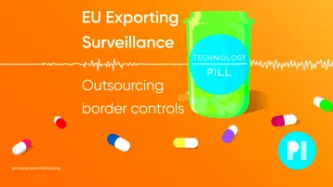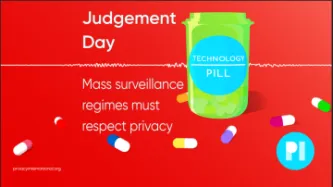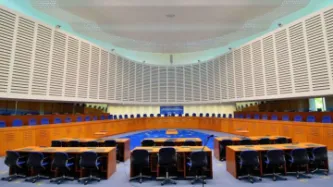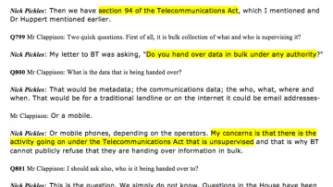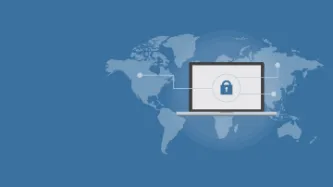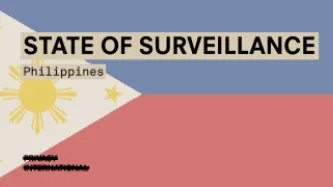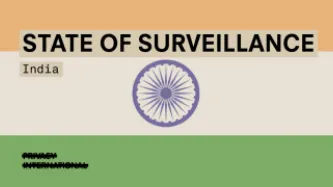Search
Content type: Video
**Language advisory: Gus does several swearwords this episode including one f-word at 9:45
From surveillance drones to cameras to wiretapping and more - the EU are providing technologies that will be used to crush political and civil freedoms and undermine democracy without urgent reforms
Find out more:
https://privacyinternational.org/long-read/4288/borders-without-borders-how-eu-exporting-surveillance-bid-outsource-its-border
https://privacyinternational.org/…
Content type: Long Read
Tucked away in a discrete side street in Hungary’s capital, the European Union Agency for Law Enforcement Training (CEPOL) has since 2006 operated as an official EU agency responsible for developing, implementing, and coordinating training for law enforcement officials from across EU and non-EU countries.
Providing training to some 29,000 officials in 2018 alone, it has seen its budget rocket from €5 million in 2006 to over €9.3 million in 2019, and offers courses in everything from…
Content type: Video
Find out more on our website: https://privacyinternational.org/long-read/4206/qa-eus-top-court-rules-uk-french-and-belgian-mass-surveillance-regimes-must-respect
And make sure we can keep taking these fights to court: support.privacyinternational.org
You can listen and subscribe to the podcast where ever you normally find your podcasts:
Spotify
Apple podcasts
Google podcasts
Castbox
Overcast
Pocket Casts
Peertube
Youtube
Stitcher
And more...
Content type: Press release
Today, the European Court of Human Rights (ECtHR) has handed down a decision in a case brought by Privacy International and a coalition of internet and communications service providers and campaign groups including the Chaos Computer Club (Germany), GreenNet (UK), Jinbonet (Korea), May First/People Link (US), and Riseup (US) (the “coalition”).The case challenges the conduct of hacking operations abroad by one of the UK’s intelligence agencies, the Government Communications…
Content type: News & Analysis
Today, the High Court of South Africa in Pretoria in a historic decision declared that bulk interception by the South African National Communications Centre is unlawful and invalid.
The judgment is a powerful rejection of years of secret and unchecked surveillance by South African authorities against millions of people - irrespective of whether they reside in South Africa.
The case was brought by two applicants, the amaBhungane Centre for Investigative Journalism and journalist Stephen…
Content type: Long Read
image from portal gda (cc)
Many people are still confused by what is 5G and what it means for them. With cities like London, New York or San Francisco now plastered with ads, talks about national security, and the deployment of 5G protocols being treated like an arms race, what happens to our privacy and security?
5G is the next generation of mobile networks, which is meant to be an evolution of the current 4G protocols that mobile providers have deployed over the last decade, and there are…
Content type: News & Analysis
Privacy International has joined a global coalition of privacy campaigners, tech companies, and technology experts to respond to proposals by British intelligence chiefs aimed at allowing them access to encrypted messaging apps such as WhatsApp or Signal.
If implemented, the proposals would allow government authorities to force messaging platforms to silently add a law enforcement participant to a group chat or call.
Such a capability poses serious threats to…
Content type: Long Read
Imagine that every time you want to attend a march, religious event, political meeting, protest, or public rally, you must share deeply personal information with police and intelligence agencies, even when they have no reason to suspect you of wrongdoing.
First, you need to go to the police to register; have your photo taken for a biometric database; share the contacts of your family, friends, and colleagues; disclose your finances, health records, lifestyle choices, relationship status, and…
Content type: Long Read
If you operate an internet company in Russia, you aren’t necessarily surprised to one day open the door to someone, grasping in one hand a bundle of wires and in the other a letter from a government agency demanding access to your servers, with a black box wedged under one arm.
Internet companies in Russia are required by law to store the content of users’ communications for six months and the metadata of users’ communications for three years, essentially meaning that what a person does…
Content type: News & Analysis
El 10 de mayo de 2018, en el marco del 30º período de sesiones del Examen Periódico Universal (EPU) en el Consejo de Derechos Humanos de las Naciones Unidas, toca la revisión de Colombia, lo que es una oportunidad Colombia y otros Estados para declarar qué acciones han tomado para mejorar la situación de derechos humanos en sus propios países, para cumplir sus obligaciones internacionales en la materia.
Colombia se encuentra actualmente en un punto de inflexión, debido al proceso de transición…
Content type: News & Analysis
On 10 May 2018, Colombia’s human right record will be reviewed as part of the 30th session of the Universal Periodic Review (UPR), under the auspices of the Human Rights Council, which provides the opportunity for each State to declare what actions they have taken to improve the human rights situations in their countries and to fulfil their human rights obligations.
Colombia is at an important turning point in its history as it transitions from four decades of conflict. This provides…
Content type: Press release
Privacy International and Open Rights Group have submitted a response to the Consultation on establishing a UK Privacy and Civil Liberties Board.
Content type: Press release
Please find attached a copy of the briefing along with promotional photographs with the briefing.
Privacy International has today sent top EU and UK Brexit negotiators* a briefing on their vulnerability to potential surveillance by each other, and others. Brexit negotiations are to begin today.
The global privacy rights NGO has highlighted to the negotiators the risk of sophisticated surveillance capabilities being deployed against each other and by others, and provided…
Content type: Press release
Caroline Wilson Palow, General Counsel at Privacy International
“The passage of the Investigatory Powers Act is a major blow to the privacy of people in the UK and all over the world. It sets a world-leading precedent, but not one of which the Government should be proud. Instead of reining in the unregulated mass surveillance practices that have for years been conducted in secret and with questionable legal authority, the IPA now enshrines them in law. Widespread surveillance is an antithesis…
Content type: Long Read
This week, Privacy International, together with nine other international human rights NGOs, filed submissions with the European Court of Human Rights. Our case challenges the UK government’s bulk interception of internet traffic transiting fiber optic cables landing in the UK and its access to information similarly intercepted in bulk by the US government, which were revealed by the Snowden disclosures. To accompany our filing, we have produced two infographics to illustrate the…
Content type: Press release
Today Sir Stanley Burnton, the Interception of Communications Commissioner, published a highly critical review of the use of Section 94 of the Telecommunications Act 1984 for gathering vast amounts of our communications data in bulk. This obscure clause pre-dates the internet era, but has been used for nearly two decades for mass surveillance. Today is the first time that these powers have been criticised by an independent statutory body. IOCCO is critical of the Government's use of these…
Content type: Long Read
1984: A broad law, a broad power and a whole lot of secrecy
In the wake of litigation brought by Privacy International (‘PI’) and as the Government prepared to introduce the Draft Investigatory Powers Bill (‘IP Bill’) in November 2015, there was a cascade of ‘avowals’- admissions that the intelligence agencies carry out some highly intrusive surveillance operations under powers contained in outdated and confusing legislation.
It is disappointing that it has been almost six months since…
Content type: News & Analysis
This guest piece was written by Jane Duncan of the Right2Know Campaign. It does not necessarily reflect the views or position of Privacy International.
On 23rd March the United Nations Human Rights Committee released its assessment on South Africa’s compliance with the International Covenant on Civil and Political Rights (ICCPR). The report includes a blistering attack on the Government for failing to respect the privacy of the communications of users and makes…
Content type: Long Read
Written by: Maria del Pilar Saenz
With a raft of recent scandals involving proven and possible abuses of surveillance systems by state institutions, there is a clear need to generate policy and practice in Colombia that promotes respect for human rights. It is necessary to keep this in mind as an emerging public policy discussion on cybersecurity led by CONPES (The National Council for Economic and Social Policy) begins in Colombia. This series of reforms will serve as the policy basis…
Content type: Long Read
This guest piece was written by Jessamine Pacis of the Foundation for Media Alternatives. It does not necessarily reflect the views or position of Privacy International.
Introduction
With a history immersed in years of colonialism and tainted by martial law, Philippine society is no stranger to surveillance. Even now, tales of past regimes tracking their citizens’ every move find their way into people’s everyday conversations. This, for the most part, has kept Filipinos…
Content type: Long Read
Written by: Centre for Internet and Society
This guest piece was written by representatives of the Centre for Internet and Society (CIS). It does not necessarily reflect the views or position of Privacy International.
Introduction
As part of the State of the Surveillance project, CIS conducted a review of surveillance law, policy, projects, and trends in India. Below we provide a snap shot of key legal provisions governing surveillance in India and touch on…
Content type: Press release
Today’s report by the Joint Committee on the Investigatory Powers Bill is the third committee report that concludes that the Home Office has failed to provide a coherent surveillance framework.
The Joint Committee on the Investigatory Powers Bill today published a 198 page report following a short consultation period between November and January. Their key findings are that:
- the definitions in the bill need much work, including a meaningful and comprehensible…
Content type: News & Analysis
On July 6th, the company Hacking Team was hacked: over 400GB of administrative documents, source code and emails are now available for download.
Documents from the hack confirm once again the claims made in our report Their Eyes on Me, the Moroccan intelligence services made use of Hacking Team's spyware 'Remote Control System' to target those whom they perceive as their opponents. The documents show the two intelligence agencies in the country have been renewing their contracts and…
Content type: News & Analysis
The French Government unveiled a new Bill that aims at providing a legal framework to intelligence services last Friday. While Privacy International welcomes the positive step of placing powers that were until now poorly regulated under the law, we remain alarmed by many aspects of this Bill. Two months after the deadly terrorist attacks in Paris that targeted the satirical weekly Charlie Hebdo and a Kosher supermarket, the Government seeks to provide the intelligence services with a…
Content type: News & Analysis
In a recent trip to Colombia, Privacy International learned that the Colombian mobile phone network does not use any form of encryption. In this sense, Colombian communications are stuck in the 1990s, where cryptography was not yet widespread, and was still tightly controlled by governments who feared its spread could threaten their capabilities to conduct surveillance.
The issue of encryption on mobile phones though is not unique to Colombia. The Director of the FBI has been on a media blitz…
Content type: Long Read
Many people imagine intelligence sharing to be a practice whereby men in trench coats silently slide manilla envelopes containing anonymous tip-offs or intelligence reports marked TOP SECRET across tables in smoke-filled rooms.
While such practices certainly exist, they represent only a tiny slice of intelligence sharing activities, and are vastly overshadowed by the massive exchange of bulk unanlysed (raw) intelligence data that takes place between the UK and its Five Eyes allies.…
Content type: News & Analysis
Thousands of innocent people in London have had their communications spied on and collected through the use of invasive mobile phone surveillance technology, called IMSI Catchers, according to a recent report by the Times.
IMSI Catchers are no longer, and have not been for a while, a law enforcement secret. They have been featured crime dramas like the Wire and in movies such as Zero Dark Thirty. For years, the German Parliament has publicly received the number of IMSI Catcher…
Content type: News & Analysis
UPDATE: The Kosovar minister of European integration – Vlora Citaku – announced in a tweet on April 29th that the government has approved the law on the interception of telecommunications. The draft law will now be reviewed by the parliament.
_____________________________________________________________
The government of Kosovo is currently preparing a new surveillance law that will turn Kosovar network operators and service providers into de facto agents of the Kosovo…
Content type: Press release
The ruling today from the European Court of Justice, invalidating the European Union’s 2006 Data Retention Directive policy, was strong and unequivocal: the right to privacy provides a fundamental barrier between the individual and powerful institutions, and laws allowing for indiscriminate, blanket retention on this scale are completely unacceptable.
As the Court states, it is not, and never was, proportionate to spy on the entire population of Europe. The types of data retained under this…
Content type: News & Analysis
On Monday, Privacy International submitted a dossier to the National Cyber Crime Unit of the National Crime Agency on behalf of Ethiopian political refugee Tadesse Kersmo, asking them to investigate the potentially unlawful interception of Tadesse's communications, as well as the role a British company played in developing and exporting the invasive commercial surveillance software called FinSpy that was found on Tadesse's computer.
Here, we address some of…
